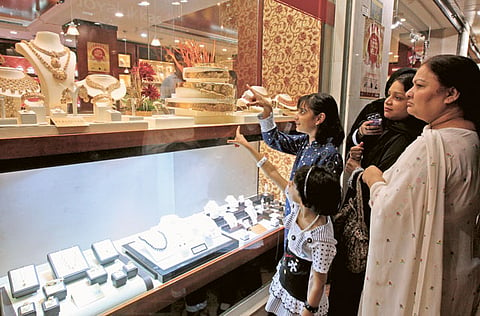Dubai's gold trade loses its sparkle
Indian buyers prefer to send remittances home to benefit from exchange rate

Dubai: The Indian rupee's rapid decline has taken the sheen off Dubai's gold and jewellery retail prospects in the past two weeks, with prospective shoppers preferring to send funds back to their home country and making full use of the exchange rate benefits. Interestingly, this sentiment has taken hold at a time when gold prices have dropped and the dollar strengthened.
Same-store sales at some of the leading jewellery chains are reportedly down by 20-30 per cent from a month ago. More worryingly, the prospects of an improvement in the first few days of June look remote.
"It's proving to be a quiet period for the trade and if the rupee's weakness continues it will not bode well in the weeks leading up to summer," said Cyriac Varghese of Sky Jewellery.
"By then the jewellery market will be taking another dip during the summer with the majority of consumers heading for their breaks."
The extended buying dip comes at a most inopportune time for retailers and more so for habitual gold buyers, given that the metal's price has dipped by quite a margin in recent weeks. It was principally brought on by the Eurozone volatility and as investors bought into the dollar.
That Dubai's gold trade is not pulling its weight will tell on the retail sector as a whole at some point. It will then come even as other key categories such as fashion, automotive, F&B and groceries put in significant growth numbers.
Turmoil
It is a season of turmoil for India's gold and jewellery sector as well. The first jolt came when the Indian government imposed import and excise duties in the recent budget.
"For the period between March 15 to April 10, trade was down by as much as 50 per cent as the industry went on strike against the government measures," said Mehul Choksi, chairman and managing director of the $2.5 billion (Dh9 billion) Gitanjali jewellery chain which operates 4,000 point-of-sales in India and has a presence in the US, China and plans to grow its network in the Gulf. "Thankfully, some of the measures have now been removed."
That's when the rupee started to show volatility. But Choksi contends that this has so far not hit consumption of gold and jewellery within India because of the ongoing wedding season when demand scales new highs.
"This season goes on until mid-July and then it drops before starting again in October," Choksi added.
Is it then to counter the traditional market cycles in India that Gitanjali will have a $100 million network expansion in the UAE? In other words, does a wider presence in the Gulf provide more stability for future revenue streams?
"There's a certain stability from a more established retail presence in the UAE, where we will have 100 stores from the current three and 200 point-of-sales from the 75 now," Choksi said. "The buying power here is more sustained and more powerful than many of the other global markets — that's more of an incentive for us."
As for the other Gulf markets, the brand prefers to go through the B2B route by offering its branded merchandise through retailers there. The target is to generate $500 million in revenues from these markets by 2015.
Imports duty up
The duty on bullion imports into India had been Rs30 (Dh2) per gram which was then revised to two per cent in January. But during the budget in March it was hiked to four per cent. "In general this has affected the gold trade in India, though it was showing some recovery due to the requirements during the wedding season," said Cyriac Varghese of Sky Jewellery.
Sign up for the Daily Briefing
Get the latest news and updates straight to your inbox



